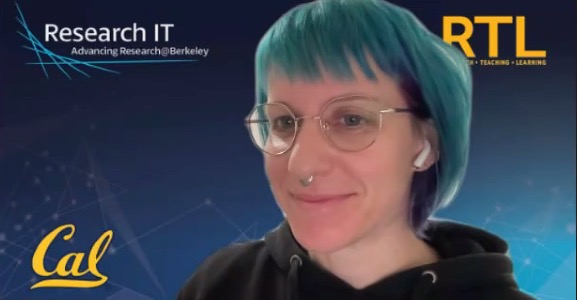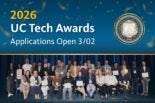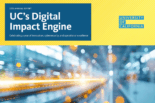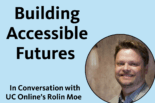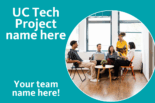Amy Neeser, the Research IT consulting and outreach lead at UC Berkeley, recently shared her expertise on leadership and inclusivity in research with the UC IT blog editors. Neeser has been at UC Berkeley for over five years. Her primary responsibility is to leverage data and computing resources to help faculty, students, and staff achieve their research objectives. During the discussion, Neeser provided valuable insights into her life inside and outside work, her approach to leadership and inclusivity, in addition to her passion for advancing UC Berkeley’s research mission. Her previous experience in librarianship has significantly influenced her approach to data curation, which she believes can bring transformational change to the Research IT field and beyond.
Watch this 10-minute interview with Amy Neeser.
Interview Transcript Highlights
A librarian’s journey to leadership in Research IT at UC Berkeley
I work in research IT which operates under the research teaching and learning organization at UC Berkeley. Our team collaborates with faculty, students, and staff to support their data and computing needs in order to advance research. My background is in librarianship, specifically in science librarianship where I initially focused on plant sciences. My passion for data grew from this work and I eventually specialized in data curation, managing a data repository as a data librarian. This led me to UC Berkeley where I managed the Research Data Management Program as part of a joint role between the library and research organization. During this time, I became interested in computing and have since combined my expertise in data and computing in my current role. As the leader of a team of data and computing experts, we work closely with UC Berkeley researchers to advance their research mission and I love my work.
Fostering career development and driving change: equity in higher education and IT
One aspect of my work that I find meaningful is working with students, both undergraduate and graduate, many of whom are on my team. It’s incredibly fulfilling to support them and help them develop their careers. Another aspect of my work that I find meaningful is enacting change on a broader scale, making our profession in higher education and IT more equitable, and creating a space that welcomes and supports people from diverse backgrounds. I believe it’s important to build diversity, equity, and inclusion into our work and strive to make a positive impact in the world.
Building a more inclusive research community through outreach and events
One way that we work towards building diversity, equity, and inclusion in our organization is through our hiring practices. I make a conscious effort to hire a diverse group of people, taking into account a range of different aspects of diversity. In addition to hiring, we also engage in targeted outreach to different research groups. For example, we recently conducted an outreach campaign to social sciences researchers, to help them understand how our big computing resources could be beneficial to them, and to promote the advancement of that field. We also work in other areas such as digital humanities. To further promote diversity, equity, and inclusion, we organize and host events that are open to the wider community. For example, we hold an annual women and data science event that highlights women and other underrepresented individuals working in data science. Recently, we also started a women in high performance computing chapter in the Bay Area, with the aim of creating a space for women and other underrepresented individuals to come together and support each other in their careers. These are just a few examples of how we are actively working towards promoting diversity, equity, and inclusion in our profession.
The importance of soft skills and using privilege to enact positive change
In my opinion, soft skills are the most important skills to have, as hard skills can be learned through education and training. Soft skills like empathy, active listening, coaching, and effective communication are critical to being an effective leader. I participated in an IT leadership program called “Lead From Where You Are” offered at UC Berkeley, which empowers people to think of themselves as leaders and consider the change they can make in their current position. When thinking about leadership, I always approach it through the lens of how we can use our privilege to enact positive change in the world. Working at UC Berkeley and in the UC system, we are in a position of privilege, and it’s our responsibility to use that privilege to make the world a better place. Effective leadership is key to achieving that goal.
Iterative improvement through active listening: enhancing services and resources
As an organization, we learn a lot from our students by listening to their feedback. In addition to this, we work on the frontline with researchers, and they often come to us with requests for specific resources or support. Conversely, we may reach out to them through targeted outreach efforts to let them know about available resources. Through these interactions, researchers may express surprise at the availability of certain resources or indicate that they require something different. We take this information back and incorporate it into our services, continually reforming and improving our platforms to ensure they are accessible and useful to a diverse range of researchers. This iterative process involves active listening and adapting to the evolving needs of our community.
Supporting personal and professional development
Firstly, I believe it’s crucial to strike a balance between work and personal life. I have many activities outside of work, such as exercise and coaching boxing and kickboxing. Taking care of oneself is also essential. During the workday, I allocate some time for my personal research, but my role has evolved into working more with people. I’m a researcher myself, I was tenured at the University of Michigan, where I was working previously before coming to Berkeley, so I do a lot of research and publishing. As a manager of all consultants, I conduct frequent check-ins, particularly with students, to ensure they have the support and resources needed to achieve their goals. I take the time to understand their aspirations, as our team’s mission is not just to complete tasks but to equip them with data and computing skills that they can apply to their research in their departments. Additionally, I facilitate team and research IT meetings and coordinate with various stakeholders to ensure that our work is organized and efficiently accomplished. I believe that my background as a librarian has helped me become an effective meeting facilitator.
Staying informed and committed to learning
I like to set aside some time to keep up with my reading. The UC IT Blog is a great resource for this because it provides bite-sized chunks of information on various topics. It’s an excellent overview, and I can always dive deeper into the topics that interest me. I appreciate the blog for its helpfulness. I’m also committed to continuing my own learning, and I believe this is a shared value among those who work at UCs. For instance, in February, there’s a symposium on how to be an antiracist campus that I’m looking forward to attending. I hope to bring back any knowledge and resources gained from the symposium to my team, and we’ll have discussions about it as well. I enjoy meeting with different people and always having new things to work on, which is what I like about my work.
The role of Research IT in advancing UC Berkeley’s research mission
The Research IT department plays a critical role in advancing the research mission of UC Berkeley by providing data and computing support. We are part of the Research Teaching and Learning (RTL) organization, which is one of several groups under the umbrella of Research, Teaching, and Learning on campus. While other groups tend to focus on EdTech, we are primarily focused on research. RTL reports up to the Vice Chancellor of Undergraduate Education, which is a unique aspect of our program. We also have a dotted line to the Vice Chancellor of Research and to Berkeley IT. Our main home is within RTL, and ultimately, UC Berkeley is where all the research magic happens.
About Amy Neeser

Research IT Consulting + Outreach Lead
UC Berkeley
I am a science + data librarian working in Research IT. I coordinate the consulting efforts across the Data Management and Research Computing programs to offer a holistic approach to data and computation. I also facilitate their community, partnership, and outreach programs.
I have experience working with data in all aspects of the research lifecycle. My professional and research interests include interdisciplinary and open digital scholarship, innovative uses of technologies in academic environments, and critical digital literacy.
UC IT Blog editor’s notes:
- Interview Transcript Highlights is based on the recorded interview with Amy Neeser, and was edited for clarity.
- With special appreciation to Joshua Hori, UC Davis, for his valued input on the video production.

